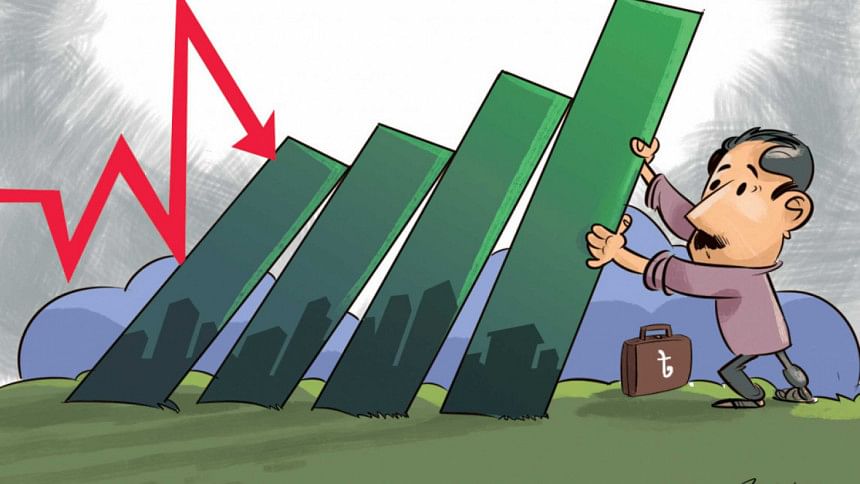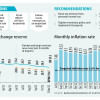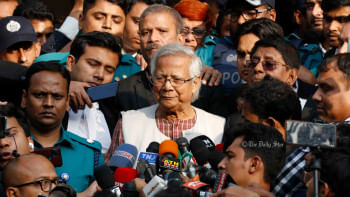Yes, Bangladesh’s sovereign rating being downgraded is a big deal

With all the problems Bangladesh has right now, Moody's downgrading of its sovereign rating is one of the worst things that could have happened. It is likely to deal a massive blow to our economy over the foreseeable future. Yet, policymakers have remained unanimously silent over the matter.
The more unlikely reason for their silence could be that they are unaware of just how big a deal this is – which seems to be the case for the majority of our population. The more likely reason behind policymakers' silence, however, is that they simply wish to brush it under the rug (their most favoured tactic when it comes to dealing with just about any issue). But this will only do more harm than good.
The downgrade of a country's rating often indicates that the rating agency believes there has been a deterioration in the country's economic or financial situation, making it riskier for investors to lend money to or invest in that country – as was done in the case of Greece in 2011. It may also indicate that the country's ability to repay debt may have weakened, and there may be increased uncertainty regarding its fiscal health – as was done in the case of Sri Lanka in 2022.
The downgrade of Bangladesh's sovereign rating from B1 to Ba3 means that the country, from being "Judged to have speculative elements and a significant credit risk," is now being "Judged as being speculative and a high credit risk" by Moody's. Among the reasons given by Moody's for this downgrade are Bangladesh's institutional weaknesses – which extend beyond economic institutions and into the political realm, but have a cumulative impact on the overall economy nonetheless – and heightened external vulnerability and liquidity risks that are persistent. "Despite some easing, ongoing dollar scarcity and deterioration in foreign exchange reserves indicate continued pressures on Bangladesh's external position, exacerbating imports constraints and as a result energy shortages," the agency said.
In its report, Moody's also mentioned that the Bangladesh government has not yet fully reversed its import control measures and unconventional policies, including a multiple exchange rate regime and interest rate caps, which are creating distortions. As a combined result of all of the above, it expects the country's gross foreign exchange reserves to remain below $30 billion for the next two to three years, with net reserves to likely be lower following Bangladesh Bank's commitment to the IMF to start reporting net reserves excluding the Export Development Fund (EDF) – which had been inflating our reserve balance on paper.
The downgrade will most definitely raise questions among foreign countries, institutions, and individuals as to the strength of our economy. Hence, foreign direct investment (FDI) into Bangladesh – an important source of acquiring foreign currency – which is already worryingly low, is likely to suffer even further, thus negatively impacting our long-term growth. Additionally, businesses will have to pay higher interest rates for loans from abroad, as lending to Bangladeshi entities will now be deemed riskier. Due to the fact that the government has been borrowing heavily from the banking sector, possibly "crowding out" private sector businesses from accessing funds, this may prove to be extremely damaging for businesses, whose borrowing options are becoming increasingly limited.
As managing funds from abroad becomes more difficult for the private sector, the deficit in the country's financial account – which is mainly responsible for the ongoing foreign exchange crisis – may worsen in the coming months, thus entrapping us in a dangerous cycle. Between July and March of FY 2022-23, Bangladesh's financial account registered a deficit of $2.21 billion in contrast to the surplus of $11.92 billion only a year before, according to Bangladesh Bank data. And, historically, Bangladesh's financial account has seen a surplus almost every year, which makes the recent rapid decline all the more concerning.
So, overall, what should we make of this downgrade, of what Moody's said, and of the government's silence in the face of it?
Firstly, there is the matter of confidence. The impact of Moody's decision to downgrade Bangladesh's rating will lower confidence in the country's economy, which plays a big part in how modern economies interact with each other. The government is silent because it realises that the effect of the rating won't be anything good, but it doesn't want to shake people's confidence in regards to its own performance – which is already abysmal.
Secondly, only a few months ago, Moody's had lowered the rating of Bangladesh's banking sector. In a sense, there aren't too many differences between how that would impact our economy, and how this recent downgrade will. And, while the government can blame external factors for our recent economic troubles all it wants, the fact is that poor government policies and unmatched corruption are at the real root of these troubles. A central factor which has contributed to both downgrades is the "looting" of our banks – leading to a liquidity crisis in the sector, among other things.
In its own assessment, Moody's has confirmed this. It said that Bangladesh's negative governance issuer profile score (G-4) indicates a plethora of challenges in controlling corruption, upholding the rule of law, and the limited credibility of its legal structures.
The reality is that our ongoing economic crisis is actually a much bigger political one. Its heart lies in the moral bankruptcy of our political class and the special interest groups it has formed a nexus with. And that is what needs to be addressed first.
Additionally, we need to move away from bureaucracy-driven policies which operate on the basis of control and command, and move on to market-enabling policies. We need an end to arbitrary governmental interference in the functioning of markets – which always results in the government manipulating the market to benefit special interest groups, and/or to veil its own corruption and flawed policies.
Those who are ideologically-driven tend to think this means an absence of regulation. But that is not the case. What we need are fewer but consistent regulations that are implemented equally across the board. What we can no longer afford are inconsistent government interference in the name of regulating.
Finally, none of these can be done without addressing corruption. And this is not something that the government will ever do of its own accord – especially when it has already gone so far down the corruption rabbit hole. The people must find some mechanism of coercing the government to do so. And we need to do this soon, given the increasingly dangerous direction in which we are headed.
Eresh Omar Jamal is assistant editor at The Daily Star. His Twitter handle is @EreshOmarJamal

 For all latest news, follow The Daily Star's Google News channel.
For all latest news, follow The Daily Star's Google News channel. 









Comments